News
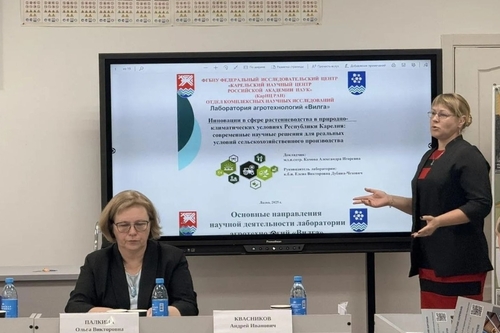
December 8, 2025
Staff of the Vilga Laboratory presented scientific developments in agritech at the year-end 2025 meeting at Agriculture Ministry
Staff of the Vilga Agrotechnology Laboratory of the Department for Multidisciplinary Research KarRC RAS took part in the session “Results of the agricultural season 2025 and plans for 2026” held in the Village of Ladva. They presented the laboratory’s major research areas and scientific developments.
Staff of the Vilga Agrotechnology Laboratory of the Department for Multidisciplinary Research KarRC RAS took part in the session “Results of the agricultural season 2025 and plans for 2026” held in the Village of Ladva. They presented the laboratory’s major research areas and scientific developments.

December 5, 2025
Olga Bakhmet proposed KarRC RAS as the host for the scientific conference on the study of Karelia’s water bodies
Doctor of Biological Sciences Olga Bakhmet took part in a meeting of the Council on Fish and Fisheries Sector Development held in Petrozavodsk on December 2nd. Active participants of the meeting were representatives of the executive and legislative authorities of the Republic of Karelia, scientists, and members of the business community. The meeting focused on prospects for the development of the sector in Karelia, utilization of seaweed resources in the White Sea, increasing production volumes, and introducing new types of products.
Doctor of Biological Sciences Olga Bakhmet took part in a meeting of the Council on Fish and Fisheries Sector Development held in Petrozavodsk on December 2nd. Active participants of the meeting were representatives of the executive and legislative authorities of the Republic of Karelia, scientists, and members of the business community. The meeting focused on prospects for the development of the sector in Karelia, utilization of seaweed resources in the White Sea, increasing production volumes, and introducing new types of products.
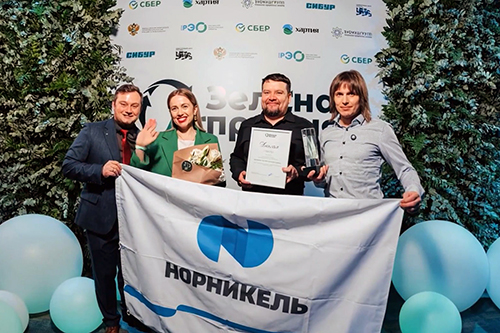
December 4, 2025
Project to roll out artificial instream egg incubators wins the Green Prize 2025
The Russian Environmental Operator awarded the winners of the Green Prize 2025. The project recognized as the best in the "Sustainable Practices in the Agricultural Industry" category is "An Integrated Technology with Artificial Nests for Fish Egg Incubation". The devices for the reproduction of young salmonid populations were designed at the Karelian Scientific Center RAS and tested in collaboration with Kola Mining and Metallurgical Company JSC (part of Nornickel). The incubators are being successfully used on rivers in northern Karelia and the Murmansk Region.
The Russian Environmental Operator awarded the winners of the Green Prize 2025. The project recognized as the best in the "Sustainable Practices in the Agricultural Industry" category is "An Integrated Technology with Artificial Nests for Fish Egg Incubation". The devices for the reproduction of young salmonid populations were designed at the Karelian Scientific Center RAS and tested in collaboration with Kola Mining and Metallurgical Company JSC (part of Nornickel). The incubators are being successfully used on rivers in northern Karelia and the Murmansk Region.
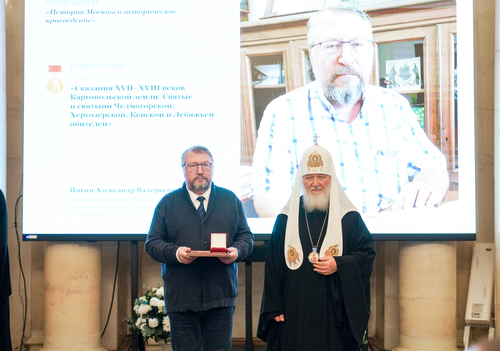
December 3, 2025
Literature scholar Alexander Pigin was awarded Makarius’s Prize for his treatise “17th-18th Century Tales of the Kargopol Land”
Leading Researcher of the Institute of Linguistics, Literature and History KarRC RAS Alexander Pigin was awarded The First Prize in Memoriam of Metropolitan Macarius (Bulgakov) of Moscow and Kolomna for his treatise “17th-18th Century Tales of the Kargopol Land. Saints and Sanctities of Chelmogorskaya, Hergozerskaya, Kenskaya and Lebyazhiia Monasteries”. The Macarius Prize is one of the main awards in the humanities in Russia.
Leading Researcher of the Institute of Linguistics, Literature and History KarRC RAS Alexander Pigin was awarded The First Prize in Memoriam of Metropolitan Macarius (Bulgakov) of Moscow and Kolomna for his treatise “17th-18th Century Tales of the Kargopol Land. Saints and Sanctities of Chelmogorskaya, Hergozerskaya, Kenskaya and Lebyazhiia Monasteries”. The Macarius Prize is one of the main awards in the humanities in Russia.
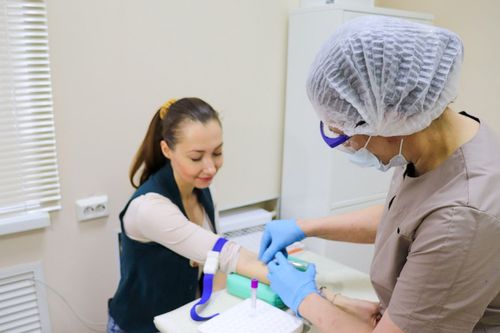
December 2, 2025
Citizens of Karelia can help scientists explore early-stage disorders and risks of developing serious diseases
Scientists invite volunteers aged 40–59 to take part in a large-scope region study seeking to identify early markers of the yet silent disorders that may later evolve into cardiovascular and metabolic diseases. Participants will be asked to give a single blood sample for key laboratory tests. The results can be collected in person or via email. In the long term, this work will enable scientists and medical professionals to detect the threat of serious diseases as early as possible.
Scientists invite volunteers aged 40–59 to take part in a large-scope region study seeking to identify early markers of the yet silent disorders that may later evolve into cardiovascular and metabolic diseases. Participants will be asked to give a single blood sample for key laboratory tests. The results can be collected in person or via email. In the long term, this work will enable scientists and medical professionals to detect the threat of serious diseases as early as possible.

December 1, 2025
Russian Science Foundation supported Karelian scientists’ projects
Four grant applications submitted by scientists of the Karelian Research Centre RAS were approved by the Russian Science Foundation. The projects by Karelian researchers deal with issues such as building a methodology for the identification, monitoring, and protection of certain wetlands, increased mortalities among young farmed trout relocated to natural water bodies, assessing the anti-inflammatory properties of natural dietary supplements promising for trout farming, and reconstruction of the thermal history of the Earth's crust formation in northern Karelia and southern Murmansk Region.
Four grant applications submitted by scientists of the Karelian Research Centre RAS were approved by the Russian Science Foundation. The projects by Karelian researchers deal with issues such as building a methodology for the identification, monitoring, and protection of certain wetlands, increased mortalities among young farmed trout relocated to natural water bodies, assessing the anti-inflammatory properties of natural dietary supplements promising for trout farming, and reconstruction of the thermal history of the Earth's crust formation in northern Karelia and southern Murmansk Region.
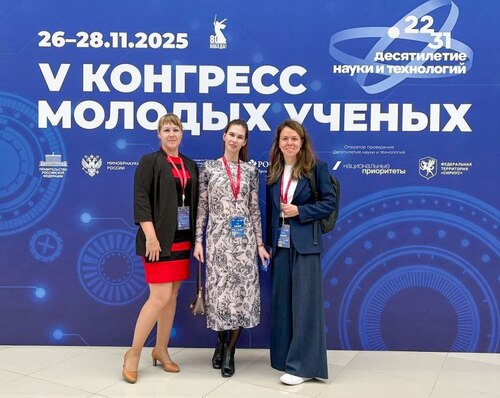
November 28, 2025
Scientists of KarRC RAS took part in Young Scientists’ Congress at Sirius
A group of researchers from KarRC RAS took part in the 5th Young Scientists’ Congress held at the Sirius Federal Territory in Sochi. Over eight thousand participants from more than a hundred countries – early-career and renowned scientists, officials and businesspersons – worked actively at the plenary sessions and discussion grounds of this international scientific forum.
A group of researchers from KarRC RAS took part in the 5th Young Scientists’ Congress held at the Sirius Federal Territory in Sochi. Over eight thousand participants from more than a hundred countries – early-career and renowned scientists, officials and businesspersons – worked actively at the plenary sessions and discussion grounds of this international scientific forum.

November 28, 2025
Karelian scientists and tour operators from regions of Russia discussed tourism development in the Arctic
Researchers at the KarRC RAS analyzed current trends and identified prospects for the development of Arctic tourism based on the judgments of tour operators from all regions of the Russian Arctic. The results of this study, their applications, and potential solutions to existing problems were discussed by participants of the 5th Workshop "Integrated Development of Arctic Territories: an Expert Opinion," which brought together interested specialists from the country's northern regions.
Researchers at the KarRC RAS analyzed current trends and identified prospects for the development of Arctic tourism based on the judgments of tour operators from all regions of the Russian Arctic. The results of this study, their applications, and potential solutions to existing problems were discussed by participants of the 5th Workshop "Integrated Development of Arctic Territories: an Expert Opinion," which brought together interested specialists from the country's northern regions.

November 26, 2025
KarRC RAS to run trials of Belarusian technologies for woody plant reproduction
KarRC RAS CEO Olga Bakhmet signed a cooperation agreement with the Belarusian Republican Forest Breeding and Seed Production Center (RBSPC). Karelian Research Centre RAS will be a base for trying out Belarusian technologies for reproduction of woody plants in a northern environment.
KarRC RAS CEO Olga Bakhmet signed a cooperation agreement with the Belarusian Republican Forest Breeding and Seed Production Center (RBSPC). Karelian Research Centre RAS will be a base for trying out Belarusian technologies for reproduction of woody plants in a northern environment.



